Releases of IOS Yearbook on Status of Muslim Dropouts
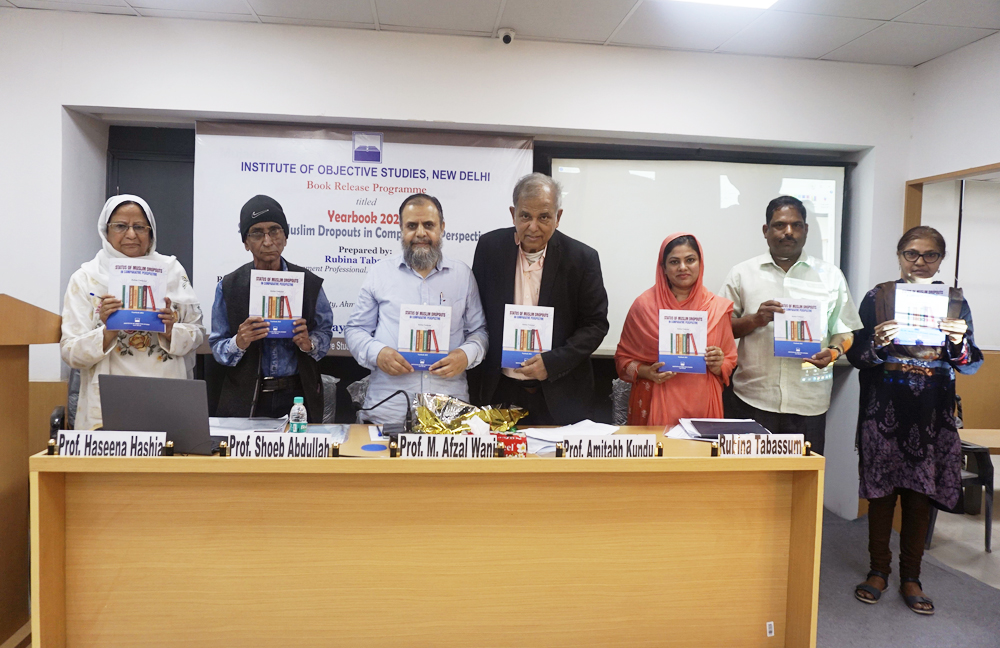
Releases of IOS Yearbook on Status of Muslim Dropouts
New Delhi, March 4, 2023: In a programme graced with the auspicious presence of intelligentsia through the hybrid mode of onsite and online participation on the national level, the second in line Yearbook from the Institute of Objective Studies (IOS) titled Status of Muslim Dropouts in Comparative Perspective was launched here today amid discussions on the crucial issues.
This special edition Yearbook is the second in the series, brought out by the Institute of Objective Studies. The first Yearbook was released in 2021—post the decision to bring such a series was taken in the year 2020. These Yearbooks are rather data books documenting the core issues related to educational status of Muslim community in India.
It is a seminal book and a towering contribution by the IOS that brought it second in the series, highlighting community and national issues as a torchbearer. The Nobel laureates – Theodore William Schultz and Gary Stanley Becker propagated the Theory of Human Capital to prove the effectiveness of investing in the core issues of education.
Undoubtedly, education has a more significant role by contributing to the communities' prosperity in the long run. Undeniably, a community lagging in education is equally an economically weaker stratum of society.
This book highlights many core issues and factual data brought by government agencies, including the Ministry of Education, Govt. of India, highlighting India's national school dropout rate in the year 2017-18 at 18.96 per cent, while pitiably the school dropout rate of Muslim students remained at 23.1 per cent for the same period. Indian Muslims are, therefore, much at the bottom of socio-economic indices.
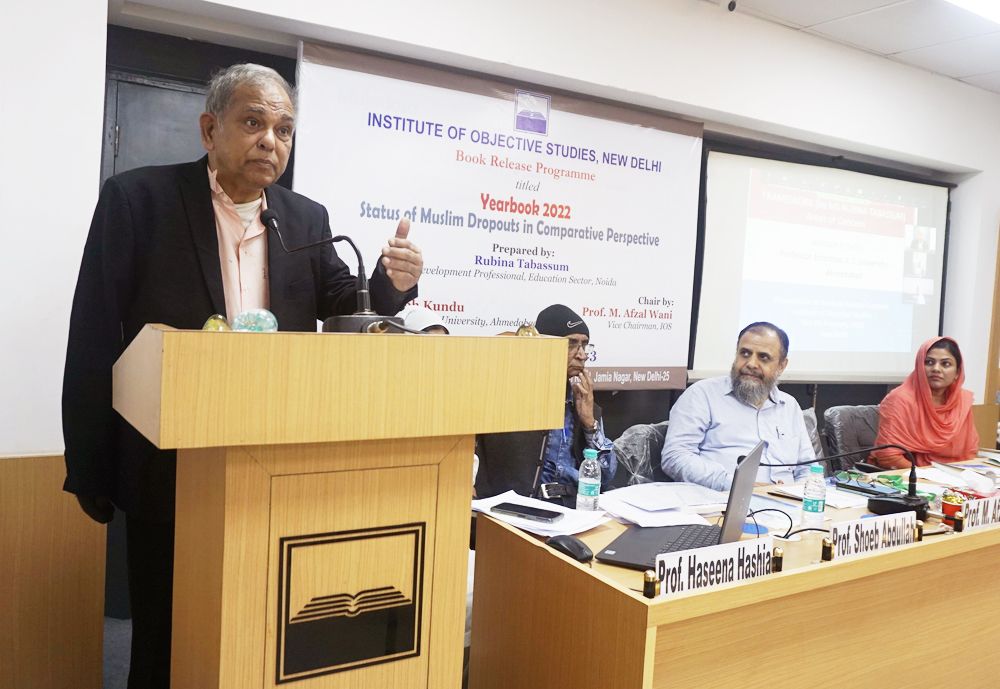
Professor Amitabh Kundu, Professor Emeritus of L.J University, Ahmedabad, while releasing the book, mentioned that it highlights household-level information for caste-wise, community-wise and, much more data about Indians, minorities and, of course, about Muslims in India. He further said it is valuable work for future researchers researching in this area.
He mentioned his deep-rooted association with Dr. Mohammad Manzoor Alam, Chairman of IOS. He further said that Dr Alam is a great person and visionary with whom I worked earlier, and through this book, an excellent database is prepared, which was undoubtedly the need of the hour.
He said that mainstream social scientists must gain detailed information from suitable sources—and IOS is doing that for future researchers. There are questions and factors why Muslims are deprived compared to other communities. Why do Muslims drop out due to a downfall in enrollment cause all issues? He felt that dropout is in all other communities, but the case is worst in the Muslim community. Ironically, Muslim women are facing a more dangerous situation, he observed.
He said that all such deprivations have been effectively presented in this book on the education sector besides describing various definitions of education. It defines dropouts in the context of a national sample survey and also does a comparative study of this vital subject.
The Indian government's definition of a dropout, if someone leaves education by deciding one's own, should be considered a dropout should be redefined. It should indeed be considered a dropout. Those who voluntarily discontinued education due to personal circumstances should also be considered dropouts. It is an essential general concern for India and not only the Muslim community. The book, therefore, redefines the concept of educational dropout, he said.
Muslim deprivation is a serious matter that this book addresses and must be looked at keenly. The per capita expenditure of Muslim kids in primary education is less than Indian Rupees 500, unlike other communities, which is overall Indian Rupees 2600. It is a big gap, and community thinkers must look at it. India must focus on Muslim literacy and education for overall growth, he concluded.
Prepared by Development Professional, Mrs. Rubina Tabassum, the Yearbook 2022 as a data book brings to the fore the data calculated from NSSO 75th Round 25.2 (Education) by Religion, State, Social Groups, Gender and by Income-expenditure quartiles. It also reveals a core issue of the investment in education by the Muslim community as compared to the rest of the communities of the same income level. Such gaps are bound to reflect and need intense attention and interest of community leaders for awareness of education in the Muslim community besides developing strategies to promote strategic investment procedures for the education sector.
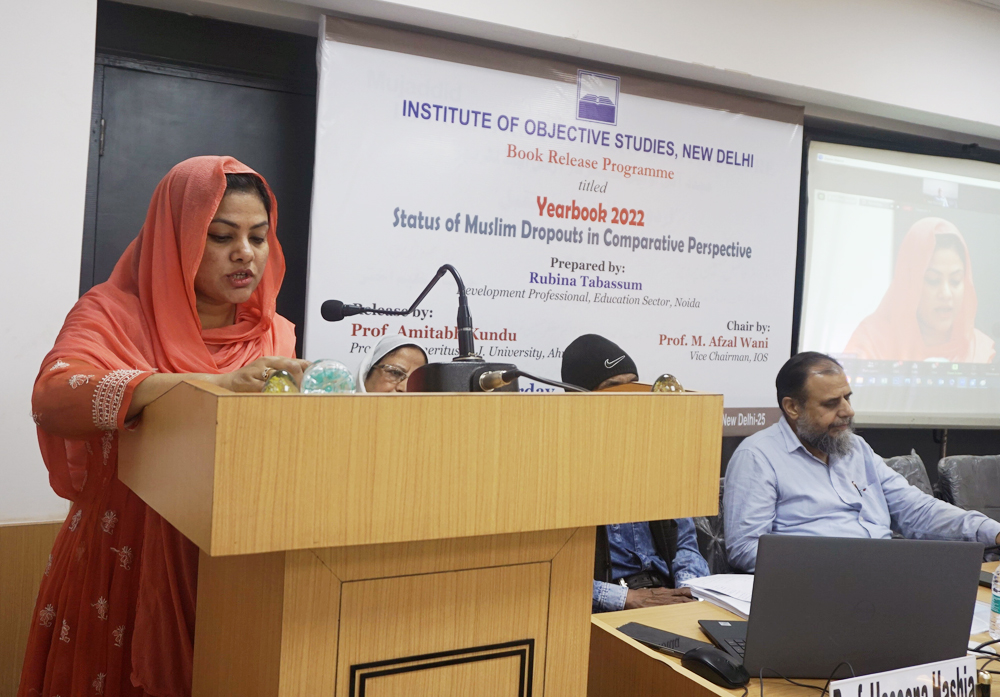
Mrs. Rubina Tabassum spoke about the book systematically dealing with the core issues of types of schools available in India, the enrollment percentage of Muslims, and most importantly, the dropouts at different levels of education. This book critically analyses multiple levels of education to show the difference in dropouts among Muslims and other religious communities besides India's numerous social groups, she said.
“This book is a dynamic analysis of income-expenditure quartile factors for assessing educational investments by every Muslim family at a certain income level. It equally does a comparative study of such elements in the light of other communities capable of investing in education at a similar income level to theirs”, she highlighted.
The Yearbook raises an essential question of why and where Muslim dropouts are on the educational ladder. One crucial factor that has found room in this Yearbook is the documentation of a few instances when government policies in India were instead not pro-Muslim education and therefore provoked the collective thought—whether it was a dropout or a push-out, she said.
While acknowledging all team members and those who supported her in bringing out the Yearbook, Mrs. Rubina Tabassum said that as a Development Professional focusing on development and women’s education, she witnessed how the community faced numerous challenges. Education is a Fundamental Right; she has worked in this area for over five years.
She highlighted that the Yearbook talks about the rich history of Muslim education in the pre-independent era besides their status as a community highlighting the core issues. It is time for introspection that even more than a decade after the introduction of the Right to Education, the dropout rate in the country has not decreased. The question is about the dropout rates of general students and the dropout rate of Muslim students. Both are to be studied critically, she emphasised.
She further said the book is based on the analysis of religious data, social groups and gender among the age group of 3 - 35. The determinants of school dropouts, underrepresentation of Muslims in India, dropout data of all societies and how weaker sections of the Muslim community lack educational avenues besides their socio-economic status thoroughly evaluated.
This book calculates the dropout percentage for all religious communities in India, particularly for Muslims, and does a comparative community-level analysis in India. Ironically, Muslim females face more deprivation than female members of other communities in India.
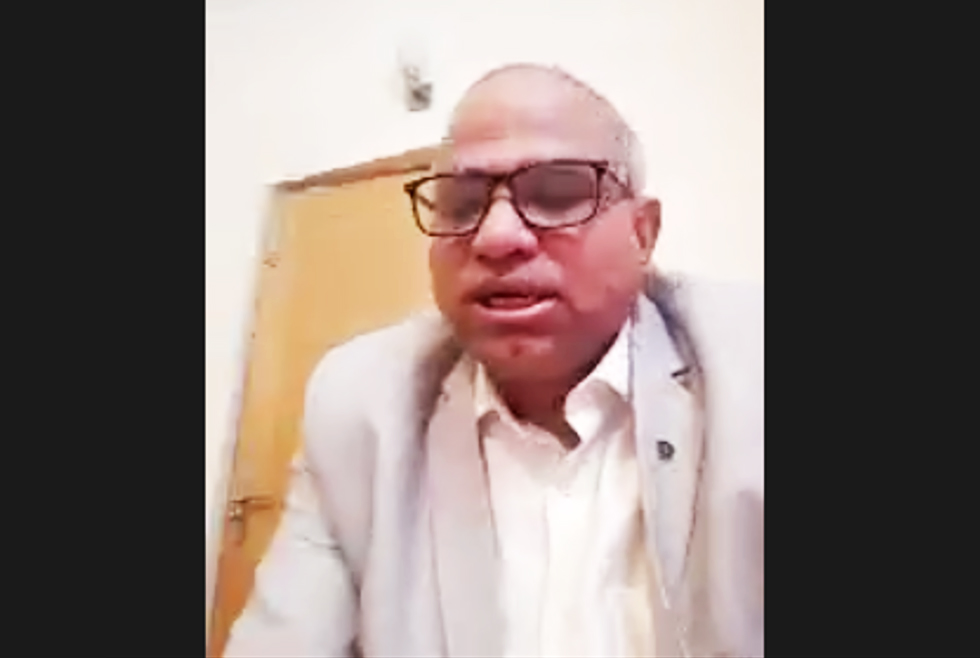
Professor (Dr.) Afsar Alam, Vice-chancellor Jamia Hamdard University, New Delhi, speaking as a guest of honour, mentioned that Muslim dropouts are still high in India, which is a big concern. Unfortunately, in higher studies, such cases are more severe. The Yearbook brought by IOS is exclusive in the context of data on the Muslim community that perhaps hardly takes education seriously in today’s India, he said.
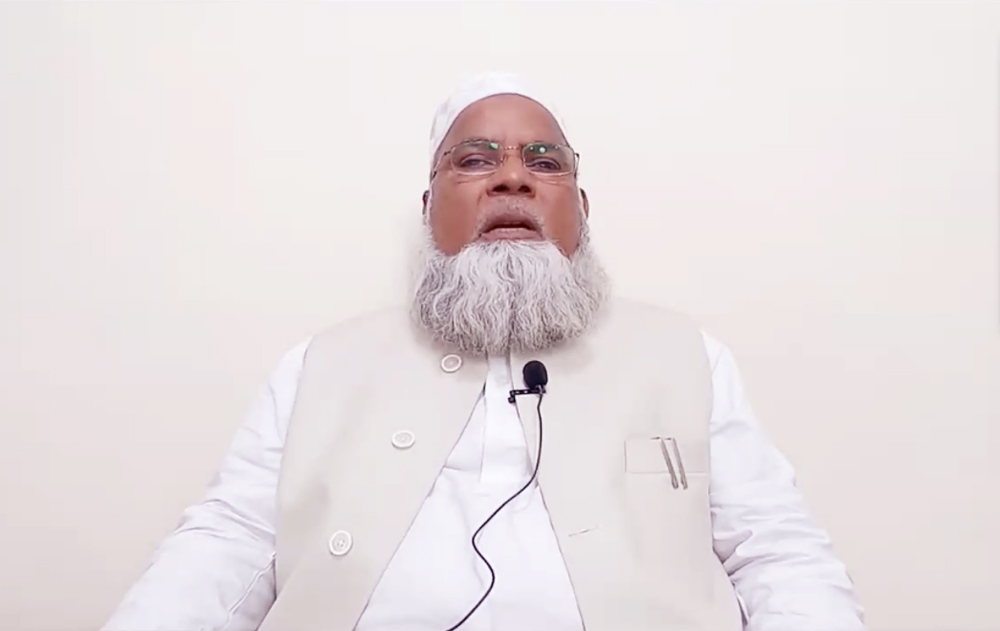
Maulana Khalid Saifullah Rahmani, General Secretary of All India Muslim Personal Law Board, highlighted that IOS is a think tank of Indian Muslims. He said that launch of this important book is an appreciable attempt. In the new education revolution of India, even graduates will not be considered educated. Higher education is required for everybody to prosper. Earlier, even lesser educated people would have secured jobs. Muslims were taught education first but are deprived today, which is a cause of concern, he observed. He applauded IOS for bringing out such exemplary work which must be translated into Urdu, Hindi and other Indian languages, he concluded.
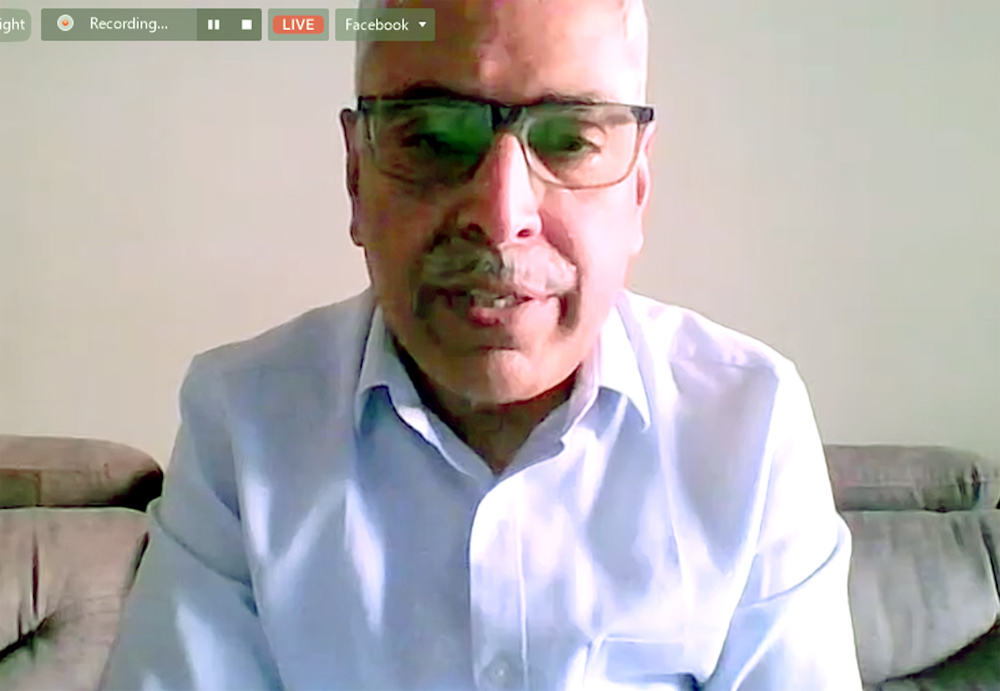
Dr N. Raja Hussain, Registrar, B.S Abdur Rahman Crescent Institute of Science & Technology Chennai, spoke that IOS fulfils the needs of all the deprived people of the country through its multiple intellectual resources. Releasing this Yearbook on the status of Muslim dropouts is excellent work. The rate of admissions is decreasing while the rate of dropouts is increasing. It is time to understand the scenario and take remedial action to control and reduce dropouts in the Muslim community.
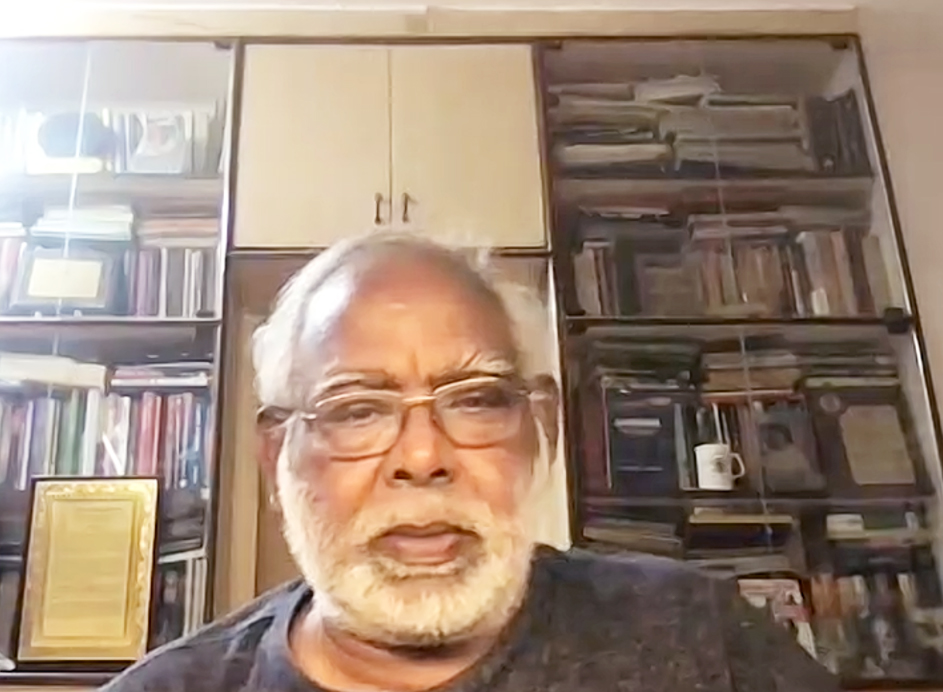
Likewise, an eminent Human Rights Activist from Delhi, Dr John Dayal, mentioned that this book is seminal as it urges introspection, especially for minorities. There is no social difference, and there is depression for people of the lower strata from the minorities. The condition is that all communities are terrorized, including Hindus in the lower strata. People are victimized, and children suffer due to that, he said.
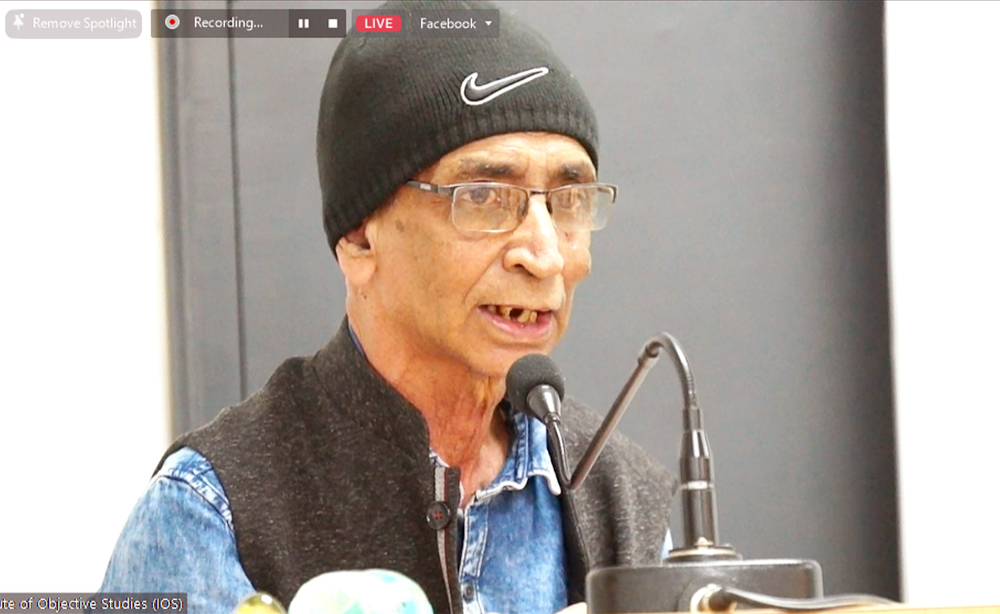
Professor Shoeb Abdullah from Jamia Millia Islamia New Delhi considered this book a detailed work of research for which IOS deserves applause. All good researchers are torchbearers for future researchers as guidance. This book will undoubtedly play a similar role in detailed research and analysis. Muslims must connect with their community members for education, he emphasised.
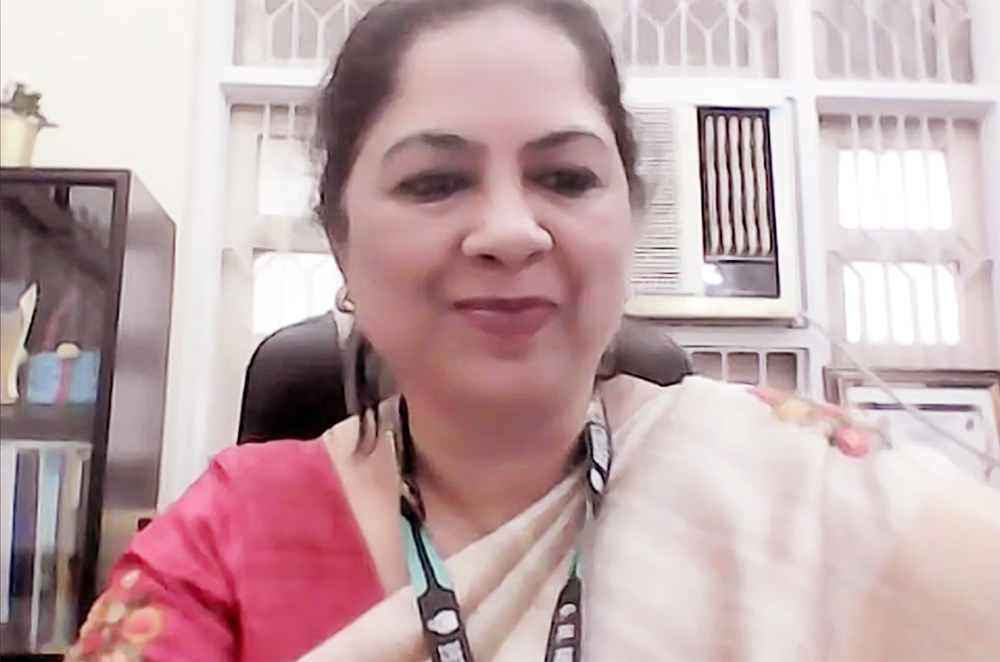
Dr Tabassum Sheikh, G.M Momin Women's College, Bhiwandi, Mumbai, considered the Yearbook a stimulating work and the need of the hour. She said that women need to showcase that commitment to education due to the many hindrances they face on multiple stages. There needs to be more guidance. It's time to know community's needs and address them diligently.
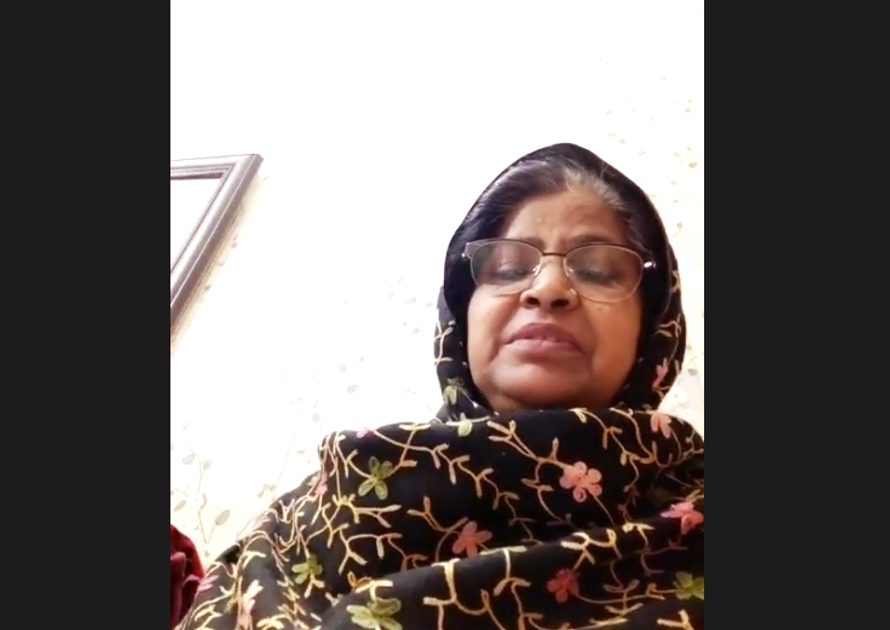
Professor Nasreen Mujib from Aligarh Muslim University, Aligarh, mentioned the reasons for constant dropouts in the Muslim community due to many factors, including financial issues. It is a big challenge for the community and those in the education sector. She also mentioned that the whole learning scenario must be changed for the quality of education.
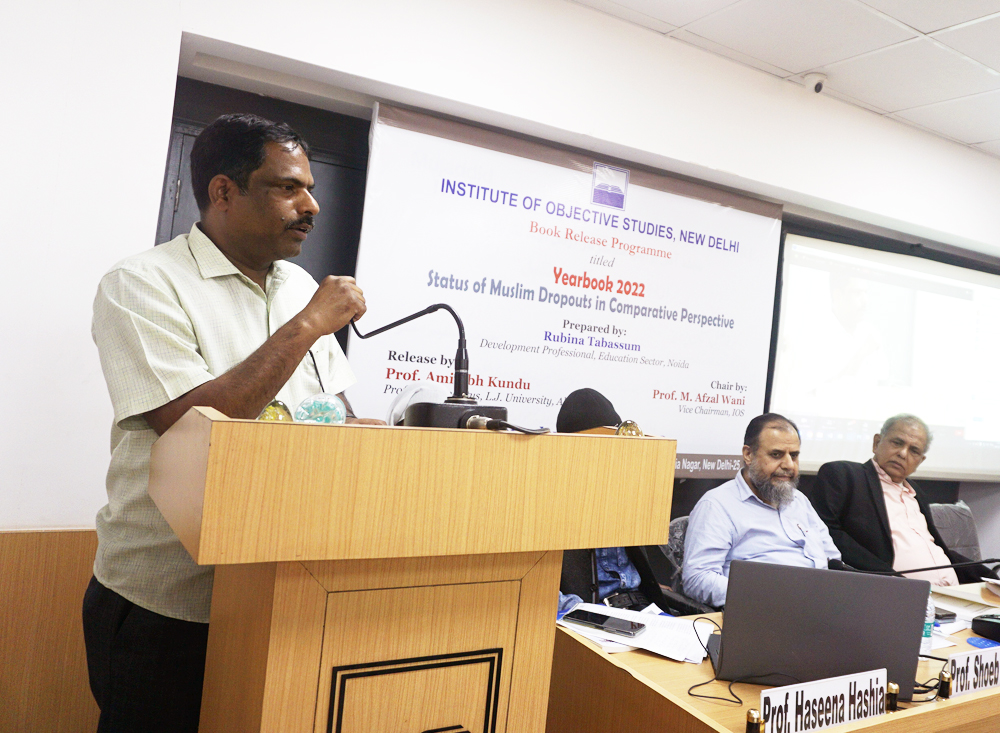
Dr Varghese Kunjappy from JNU, New Delhi, spoke about the dropouts in the religion-wise, social group-wise, economic strata-wise and gender-wise, amongst other categories as critical factors; thus, there remains a minority in the minority is the focus of the book.
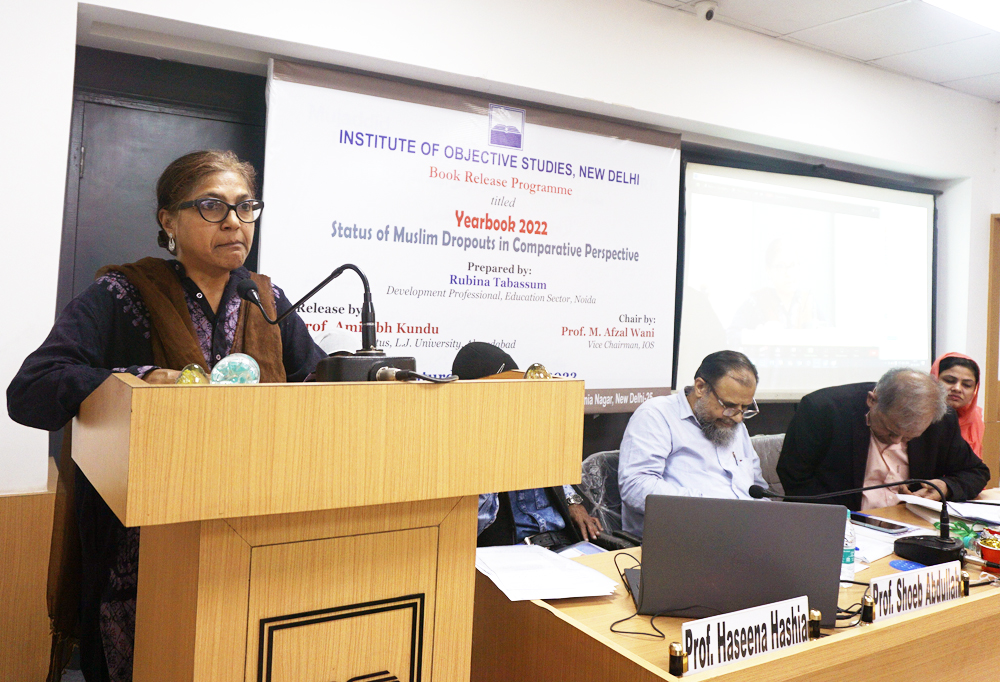
Ms. Naaz Khair, consultant on education, applauded that IOS did this brilliant work with the publication of this Yearbook. Sachar Committee Report brought extensive educational data about Muslims in India. This book systematically analyses education and Muslim education, which IOS has brought to the fore.
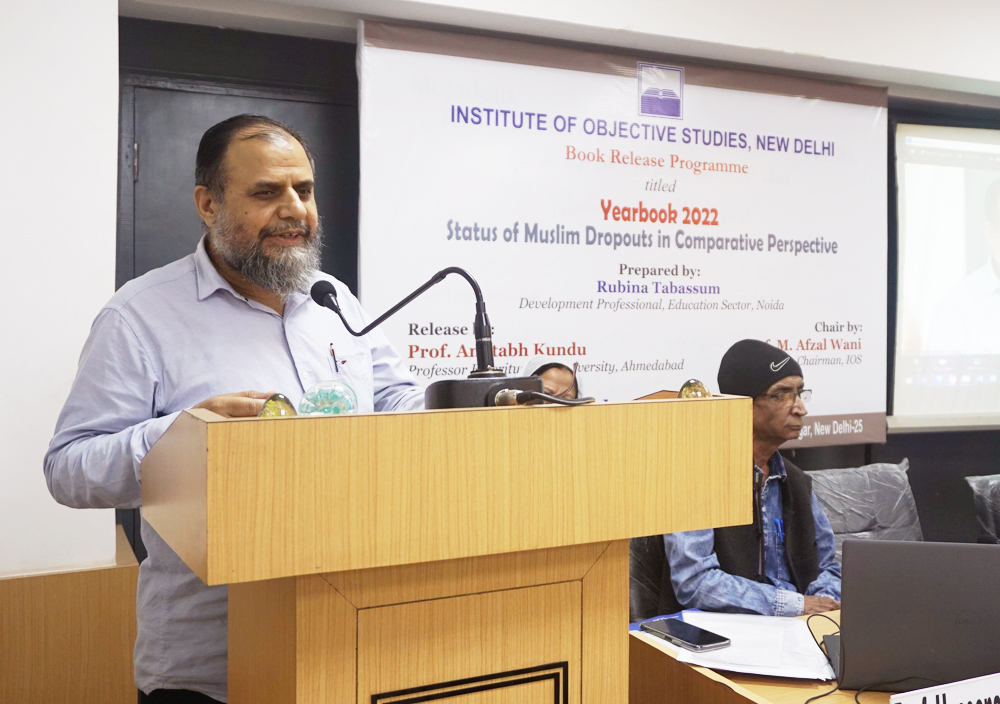
Professor M. Afzal Wani, Vice Chairman, IOS, in his presidential remarks, said that “out and dropouts as two terminologies must be understood in the context of Muslims and the masses. The behaviour of a community does matter in the cases of dropouts.
He further said that it is high time we must understand this crucial issue and went for a concrete solution even if there is one dropout. It could be a case of dropping out and not dropping out. That scenario must be understood. The need is to focus on developing a systematic pattern after assessment rather than counting what happens with the community.
Poverty is undoubtedly one reason, but many other aspects, such as the teaching and overall education systems, enforce dropout cases. The Right to Education Act 2009 is an essential provision in the context of Section 16 that talks of the responsibilities of teachers in educational institutions. All factors must be understood. “Poverty of the teachers’ intellect is more to be assessed than the poverty level of the masses while assessing educational conditions. Even a labourer can educate his kids today with strong willpower.”, he emphasized.
Ironically, such a crucial issue is ignored, although we do ground studies to eradicate such situations for a firm solution. The need is to study things from different perspectives. One can’t deny that dropouts liquidate generations, pushing them to the back foot, unlike Corona, which kills a select few individuals. It is the right time for the Muslim community to use different resources, including Awqaafs et al., to achieve their target of preventing dropouts. The initiative is significant for community leaders to awaken to enshrine respect for human values through education. With enlightenment, dropouts can be stopped anywhere in the world. The need is to have a global vision and phenomenon.
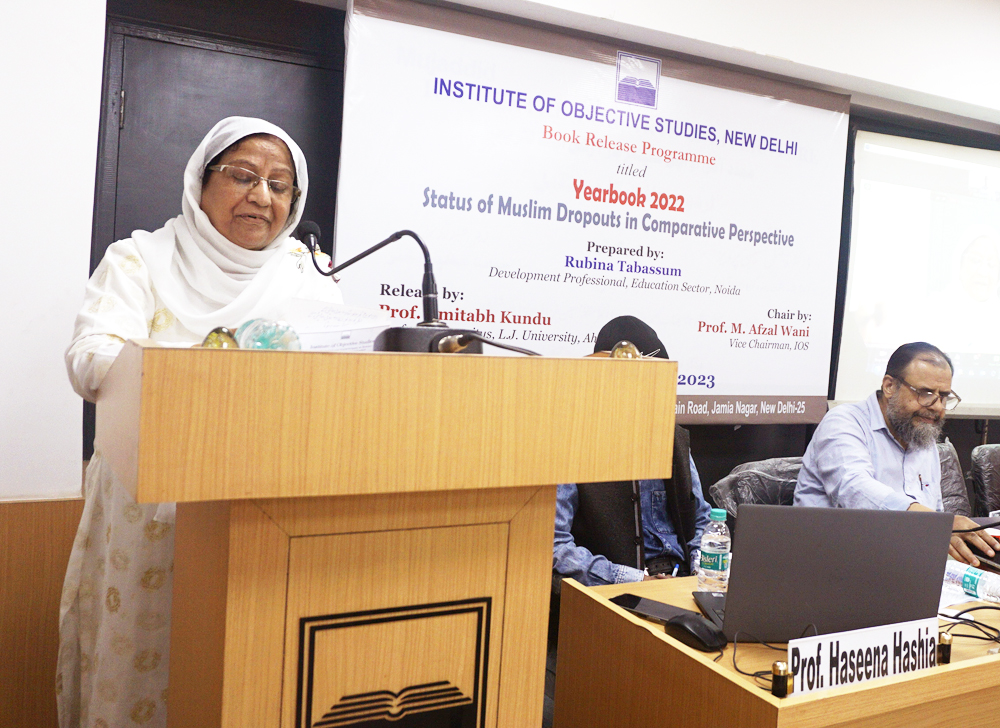
The programme concluded with a Question-Answer session followed by a formal vote of thanks proposed by Prof. Haseena Hashia, Asstt. Secretary General, IOS.
Earlier, the programme was started with the recitation of a verse from the Holy Qur’an by Maulana Athar Hussain Nadwi. Professor Haseena Hashia highlighted the various roles of IOS since its inception in 1986 and expansions throughout the country over the decades.
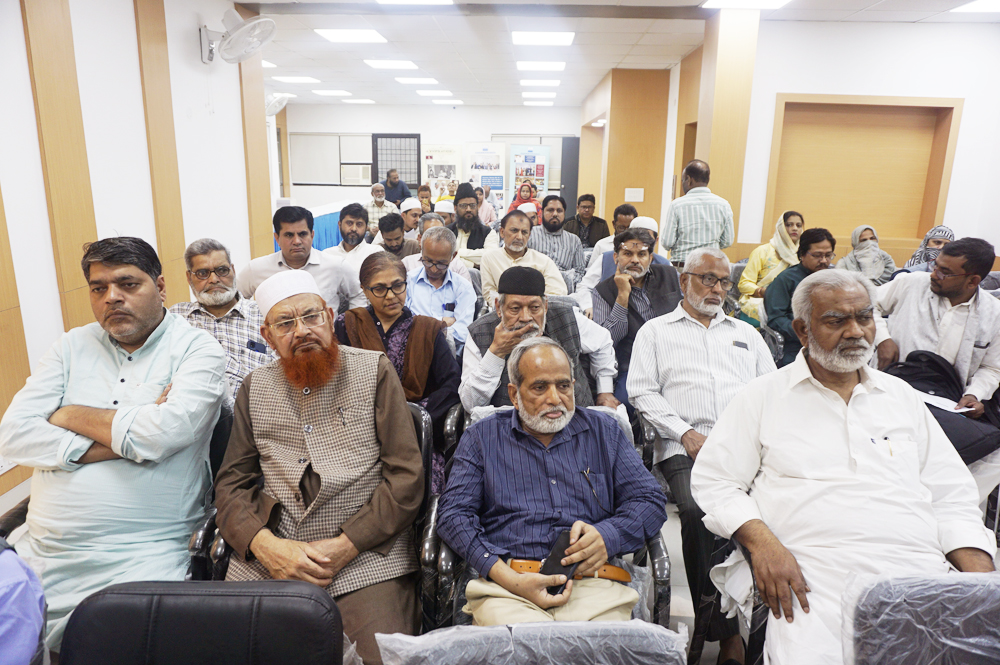
A number of dignitaries representing academics and numerous walks of life attended the book-release function.
Go Back